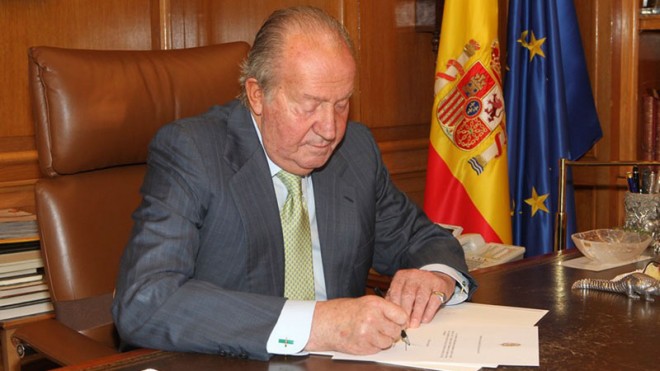Spain ponders historic abdication

In this photo released by the Royal Palace on Monday, June 2, 2014, Spain’s King Juan Carlos signs a document in the Zarzuela Palace opening the way for his abdication. Spain’s King Juan Carlos plans to abdicate and pave the way for his son, Crown Prince Felipe, to take over, Spanish Prime Minister Mariano Rajoy told the country Monday in an announcement broadcast nationwide. The 76-year-old Juan Carlos oversaw his country’s transition from dictatorship to democracy but has had repeated health problems in recent years. (AP Photo/Spanish Royal Palace)
MADRID—Spain set its future King Felipe VI on the path to the throne on Tuesday, launching an unprecedented handover of the crown amid antiroyalist protests in the economically troubled, divided realm.
One day after 76-year-old King Juan Carlos declared an end to a four-decade reign that guided Spain from dictatorship to democracy, the government met to ponder the first succession in post-Franco history.
Prime Minister Mariano Rajoy called an extraordinary Cabinet meeting to draw up a draft abdication law, which must then be approved by parliament in a process that could take weeks.
The twilight of the king’s reign has been beset by scandals.
Not all celebrated the impending arrival of his more popular son, 46-year-old Crown Prince Felipe, a 1.98-meter (six-foot-six-inch) former Olympic yachtsman, and his 41-year-old wife, the future queen Letizia, a glamorous former television news presenter.
Thousands of antiroyalists took to the streets across Spain in the hours after the abdication, calling for a vote on the monarchy’s survival.
‘No more kings’
Protesters filled Madrid’s central Puerta del Sol square and police closed access to the royal palace just a few minutes’ walk away from the demonstration.
“Tomorrow, Spain will be a republic!” chanted crowds of demonstrators brandishing placards reading: “No more kings, a referendum,” “A royal transition… without a king,” and “Bourbons up for election.”
“I think now would be a good time to proclaim a republic,” said Paola Torija, a 24-year-old therapist for the disabled. “He had his moment of glory but today it is a bit archaic, a bit useless, an extra cost especially in the crisis we are living in.”
Monarchy defended
Three small leftist parties—Podemos, United Left and the Equo green party which together won 20 percent of the vote in the May 25 European Parliament elections—called for a referendum on the monarchy.
Spain’s prime minister defended the monarchy and said a referendum would require a change in the Constitution.
“I think the monarchy has the support of the great majority in Spain,” Rajoy said when asked about referendum calls at a conference on Tuesday in Madrid.
“Propose a constitutional reform if you don’t like this Constitution. You have the perfect right to do so. But what you cannot do in a democracy is bypass the law,” he said.
Spain’s 1978 Constitution, which established the monarchy, was supported by a great majority of Spaniards in a referendum at the time, the prime minister said.
Juan Carlos was widely respected for smoothing Spain’s transition to democracy after the death of the dictator Francisco Franco in 1975, most famously facing down an attempted military coup in February 1981.
But many Spaniards were outraged when they discovered the king took a luxury elephant-hunting trip to Botswana in 2012 as they struggled to find jobs in a recession.
Resentment over the monarchy grew when the king’s younger daughter Cristina was named a suspect in relation to her husband Inaki Urdangarin’s allegedly corrupt business practices.
‘Desire for renewal’
In a televised address to the nation on Monday, Juan Carlos said the economic crisis had awakened a “desire for renewal.”
“Today a younger generation deserves to step into the front line, with new energies,” said the monarch.
In a study by pollster Sigma Dos published in January, support for the king fell to 41 percent while those wanting him to abdicate in favor of Felipe surged to 62 percent.
Most worryingly for royalists, the same survey found only 49 percent approved of the monarchy itself.
The future King Felipe VI faces a daunting challenge, analysts said.
“There will be tension, there will be difficult times, but the prince just has to demonstrate that he is capable, because he is. He has a clean record, is fair, hard working. You can’t ask for more,” royal biographer Cesar del al Lama told Agence France-Presse (AFP).
“He will not be weighed down like the king by having a corrupt son-in-law. He will not make a mistake like the Botswana hunting trip.”
‘Monarchy is obsolete’
“I would like for us Spanish people to be able to choose whether we want a monarchy or a republic. The monarchy is obsolete,” Alejandro Ricas, a 19-year-old student, told AFP.
“It is a difficult time but the prince has had the best preparation since the day he was born to lead at this moment,” said Fermin J. Urbiola, a journalist who has written several books on the king.
Republican sentiment remains widespread in Spain.
“I am here because I want to elect my head of state,” said 25-year-old Complutense University sociology student Daniel Martin.
King Juan Carlos earned his role as king by leading the nation through the transition from dictatorship to democracy, Martin said.
“For that, he was useful,” he said. “But not afterward.”
Royal scandals
The future King Felipe VI is likely to face public disquiet over the state of the economy and the royal family’s scandals, said journalist Jose Apezarena, who has written several books about the royals.
“It is a very difficult moment to come to the throne. We have a country that is in an economic crisis and the Urdangarin case has not yet been resolved,” he said.
“I think it would have been more logical to wait until the case was resolved before proceeding to the succession. The Urdangarin case is from now on going to wear down Felipe, not Juan Carlos,” he predicted.














